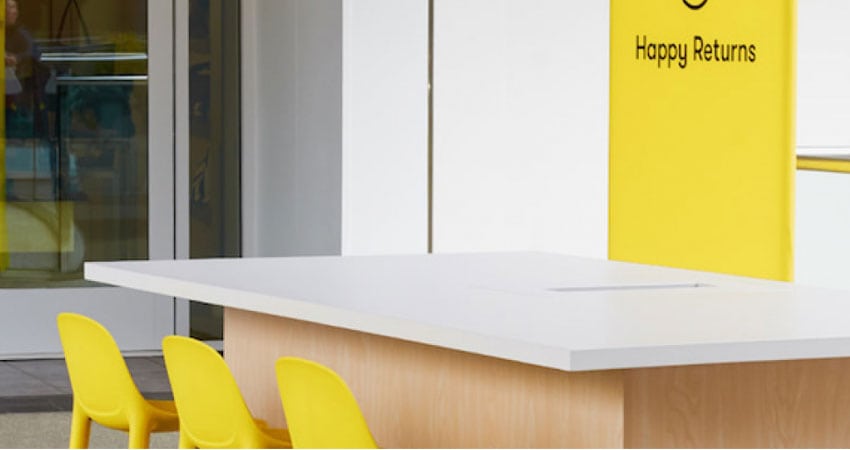A startup company is looking to ease a chronic ecommerce pain point – returns – by enabling customers to bring unwanted items to a nearby mall for fast processing and credit, even if the seller doesn’t have its own stores.
Founded in 2014, Happy Returns has “return bars” at 41 locations in 14 metropolitan areas, mostly malls owned by partners Simon Property Group, Westfield Corp., Maserich and Taubman Properties, as well as a handful of boutiques in Chicago and Los Angeles. They are staffed by store and mall personnel – the latter at service desks or kiosks – and refunds are processed on the spot using the Happy Returns app, delighting shoppers.
Customers of Happy Returns include Tradesy, Eloquii, Everlane, Chubbies and Carbon 38. The company expects to have 20 retail customers and 50 locations by the end of 2018.
Happy Returns is also testing out return bars at three Eloquii stores that started out as pop-up locations in Washington, DC, Chicago and Columbus, OH. In fact, the Chicago store opened after Eloquii executives noted the amount of traffic to the Happy Returns kiosk in a mall there.
Founder and CEO David Sobie said Happy Returns has even more ambitious goals for 2018, with plans to get to several hundred return bars. Sobie said his company uses Nordstrom’s HauteLook online brand as a model for national coverage. Sobie was HauteLook’s marketing director when it was acquired in 2011 by Nordstrom, and co-founder Mark Geller was in charge of mobile development. It was Nordstrom Rack’s in-store returns and the traffic and sales it generated that gave them the idea for their business.
“Eighty percent of HauteLook online returns are made at Nordstrom Rack’s 225 locations,” Sobie said. “We think of that as our mental model. How many locations do we need for full penetration of the country? If we can build a network of locations that’s similar in scope to Nordstrom Rack, we can capture more returns nationwide.”
Setup of a new return bar is fairly simple, Sobie said. Happy Returns comes with iPads with its app installed, and training mall or store associates takes about an hour, followed by role playing and practice returns. “We talk through common issues, and make sure the staff feels prepared,” he said.
While pure-play ecommerce companies are a natural target customer for Happy Returns, Sobie said there are increasing opportunities with “click-to-brick” firms that open up physical stores, sometimes like Eloquii through testing pop-up shops that take off. The draw for store-based retailers is obvious: Shoppers making in-store returns are more likely to make additional purchases while there.
While Happy Returns pays a fee to the mall owners where it has return bars, it doesn’t pay retail customers who are just glad to have increased foot traffic and incremental sales.
“For (click-to-brick retailers), accepting returns in store is a problem they all have to solve,” he said. “They’re realizing it’s not an easy task, especially when you start online and often have a different store POS system. So they face a choice, do we work to integrate the two systems or accept store returns? Our software can be used in stores, the same way we accept returns in a return bar.”
Perhaps not coincidentally, Happy Returns shares an investment partner – Upfront Ventures – with crowdsourced same-day delivery startup Deliv. That company has found success using malls as collection points for couriers to pick up and deliver online orders. Deliv recently expanded to 1,400 U.S. cities in 33 markets, with major retail clients including Macy’s, Best Buy, Chico’s and Petsmart. Upfront Ventures recently led a $4 million Series A funding round for Happy Returns.
“We have the same investor and we’re two sides of the same coin, one outbound, one reverse logistics, trying to provide a better customer experience,” Sobie said. “We know their team well, and what they’re doing makes a ton of sense. (Deliv founder and CEO) Daphne Carmeli and I have been on panels together.”

